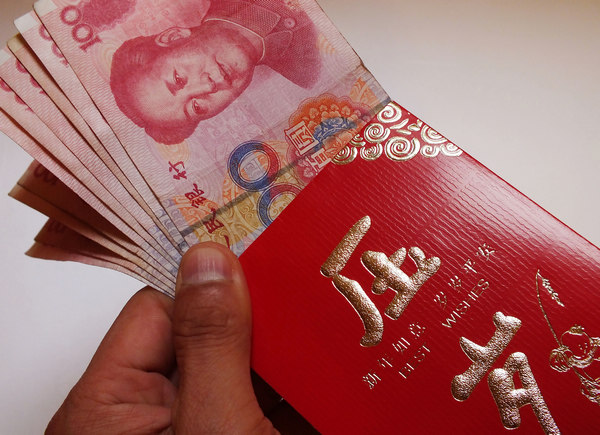Internet firms battle for relevance in red envelope race
Updated: 2016-02-09 22:51
(Xinhua)
|
|||||||||||
 |
|
Traditionally, Chinese people gives red envelopes filled with money, known as "Hongbao," to friends and relatives during the Lunar New Year celebrations. [Photo by Liu Junfeng/for China Daily] |
BEIJING -- Worried about losing traffic on their smartphone apps while people are distracted by Spring Festival celebrations, Chinese internet firms vied to keep users tuned in with cash gifts.
Traditionally, Chinese people gives red envelopes filled with money, known as "Hongbao," to friends and relatives during the Lunar New Year celebrations. Tapping into the tradition, internet firms including Alibaba, Tencent, Baidu and Sina Weibo launched apps that enabled users to send, snatch and draw cyber red envelopes on their smartphones.
Alibaba's financial arm Ant Financial allowed users of its mobile payment app Alipay Wallet to draw money in the run-up to the Lunar New Year Eve.
It partnered with the state broadcaster's annual Spring Festival gala as its official red envelope distributor during the gala's five-hour broadcast on the new year's eve.
Tencent got the upper hand on the social front as its popular instant messaging app WeChat was the primary platform for hundreds of millions of smartphone users sending and opening digital red envelopes between friends, colleagues and family.
Tencent launched the red envelope service two years ago in hope that tradition would encourage people to exchange cyber red envelopes on WeChat and spend the money through its payment service Tenpay.
The plan worked, with millions of users tying their bank card with Tenpay to transfer money, shop online or simply send out more cyber envelopes on WeChat. Other domestic internet firms followed suit, but with mixed results.
The enthusiasm for various forms of cyber red envelopes has been high among Chinese smartphone users, though the money they get is often minuscule.
Despite shaking her phone day after day for pocket money from Alipay this year, Hao Yueyua often received less than one yuan. But she never gets bored.
"It has a lot to do with luck, but that's what makes red envelopes on the smartphone so fun," Hao said.
For others, cyber envelopes have made gift-giving during this time of the year less burdensome.
"Sending out money envelopes on smartphone is so much more efficient than handing out physical ones," said Wu Yan, who works at a bank in central China.
"It really saves me from all the usual back-and-forth when friends and relatives show their politeness by pretending to refuse your money envelopes," she said.
Chinese microblog Sina Weibo reported a surge in daily active users on Sunday thanks to the red envelopes distributed on its apps and a surge in discussions about the Spring Festival gala.
Sina said the number of active users from Sunday to the early morning of Monday, when the five-hour live broadcast of the Spring Festival gala ended and the Chinese Lunar Year of the Monkey officially began, surged 31 percent from last year's Lunar New Year eve on Feb. 18, 2015.
It said promotional cash gifts have been distributed to 100 million users through the platform.
Celebrities and dignitaries from Hong Kong and Taiwan to the United States and the United Kingdom also used Weibo to send out celebratory greetings for the Lunar New Year. The United Nations teamed up with Chinese actor Liuxiaolingtong, known in China for his portrayal of Monkey King in the TV series Journey to the West, to send out wishes to the Chinese for the Year of Monkey.
Related Stories
More people around the world now share Chinese New Year joy 2016-02-09 14:25
London's Chinese New Year gala rings in Year of Monkey 2016-02-08 20:40
Chinese New Year celebrated with fireworks in New York 2016-02-08 15:51
Flash mob in monkey costumes appears in NYC to mark Chinese New Year 2016-02-08 15:51
Ditan Park temple fair embraces Chinese New Year 2016-02-08 14:55
Today's Top News
China's growth benefits UK and the world:ambassador
China detects first imported case of Zika virus
Cameron expects even better ties with China
Eight dead in train crash in Germany
Seven dead, hundreds injured after quake flattens buildings in Taiwan
Jack magic
Famous rebel with the golden gaze
Changan Automotive consolidates UK operations
Hot Topics
Lunar probe , China growth forecasts, Emission rules get tougher, China seen through 'colored lens', International board,
Editor's Picks

|

|

|

|

|

|






